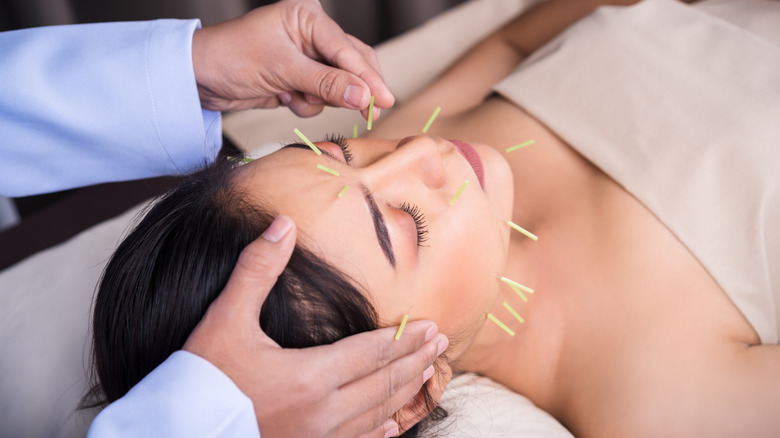Pressure Points That Will Help Reduce Your Allergies
Even though springtime is filled with vibrant colors and scents, oftentimes that beautiful scenery comes at a cost for those with seasonal allergies. If blooming flowerbeds are giving you sniffles and watery eyes, acupuncture may help reduce your allergy symptoms (via MindBodyGreen).
Before getting started, there are a couple of things to remember. First, hold each pressure point for a minimum of 30 seconds and up to 90 seconds (via MindBodyGreen). Second, create space for relaxation while pressing these points for a more restorative experience, according to Healthline. Lastly, use firm pressure and move in a rotating motion. Now you're ready to begin!
The first point is stomach 36, which is about four fingerprints down from your kneecap (via MindBodyGreen). Press toward the outer area of your shin and breathe deeply. Found on the back of your hand, is the next pressure point — large intestine 4, known for its headache-relieving powers. To find this pressure point, place your opposite thumb on the space between the index finger and thumb. The last point is large intestine 20, which helps opens the nasal passage and reduce sinus pressure. Place each index finger right outside the sides of each nostril, then press at the same time. Breathe deeply and hold.
Does acupuncture effectively treat allergies?
Now that you're familiar with three pressure points to help alleviate seasonal allergies, here's the research behind why it works. Acupuncture dates back thousands of years and is an ancient practice that began in China. The idea is that the body contains energy (ying and yang), known as Qi, which freely flows along different meridians (via Healthline). During an acupuncture session, tiny needles are placed along various points to help restore and balance the energy flow within the body.
One benefit of acupuncture is its ability to relieve seasonal allergic rhinitis, also known as hay fever, according to a 2013 study published in Annals of Internal Medicine. Researchers reported that participants who received pressure points specific to reducing their allergy found greater relief than those who received meaningless pressure points. However, more research is needed to understand its effectiveness.
Acupuncture may also help treat eczema, or atopic dermatitis (an itchy skin rash), according to one clinical 2012 study published in Allergy. Researchers found that acupuncture was just as effective as oral antihistamines at reducing itchiness of the skin. Lastly, while research has shown that acupuncture is very effective for pain management (i.e. migraines, headaches, etc.), experts advise using it concurrently — and not as a substitute — with conventional medicine (via Medical News Today).


